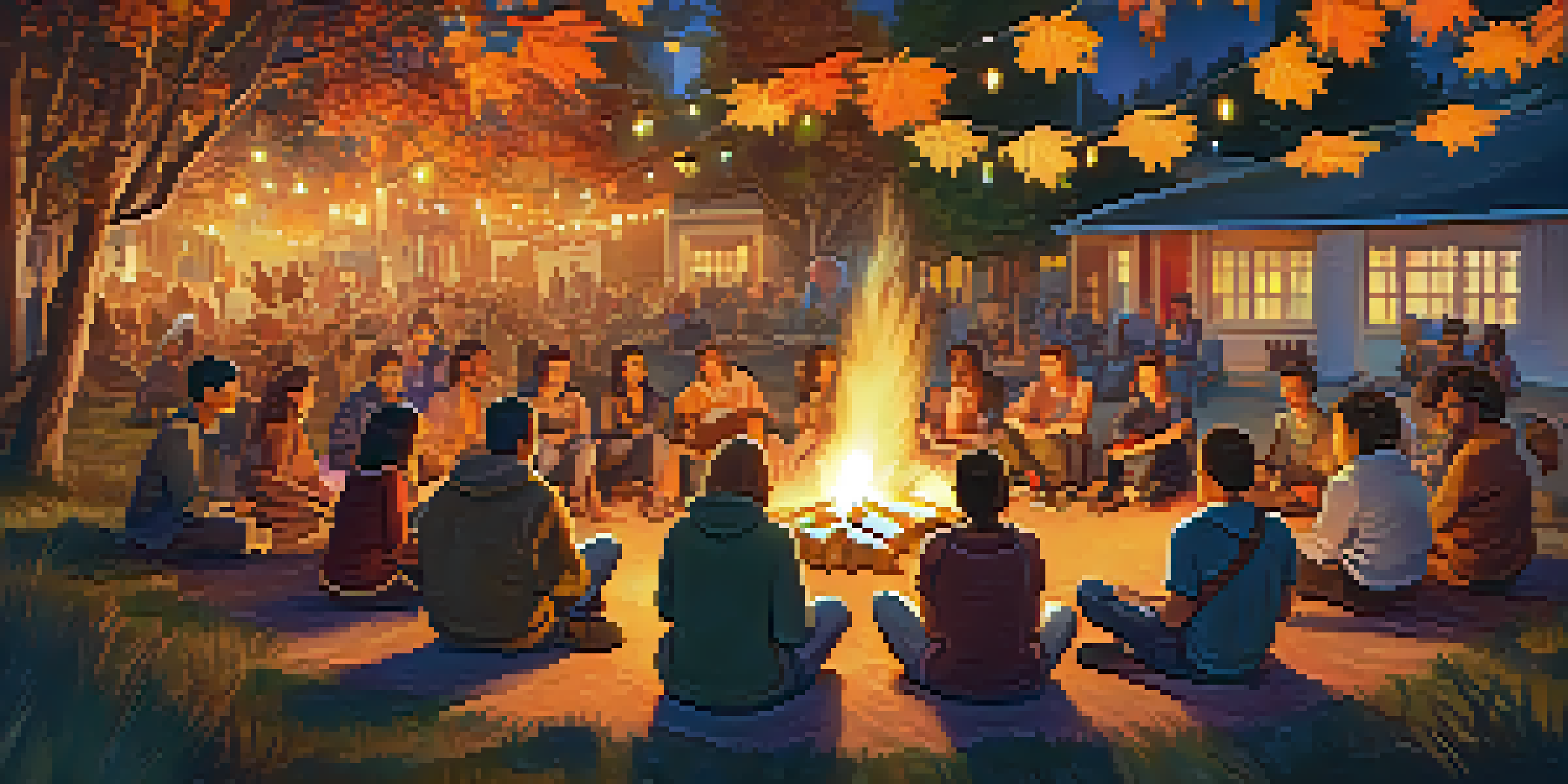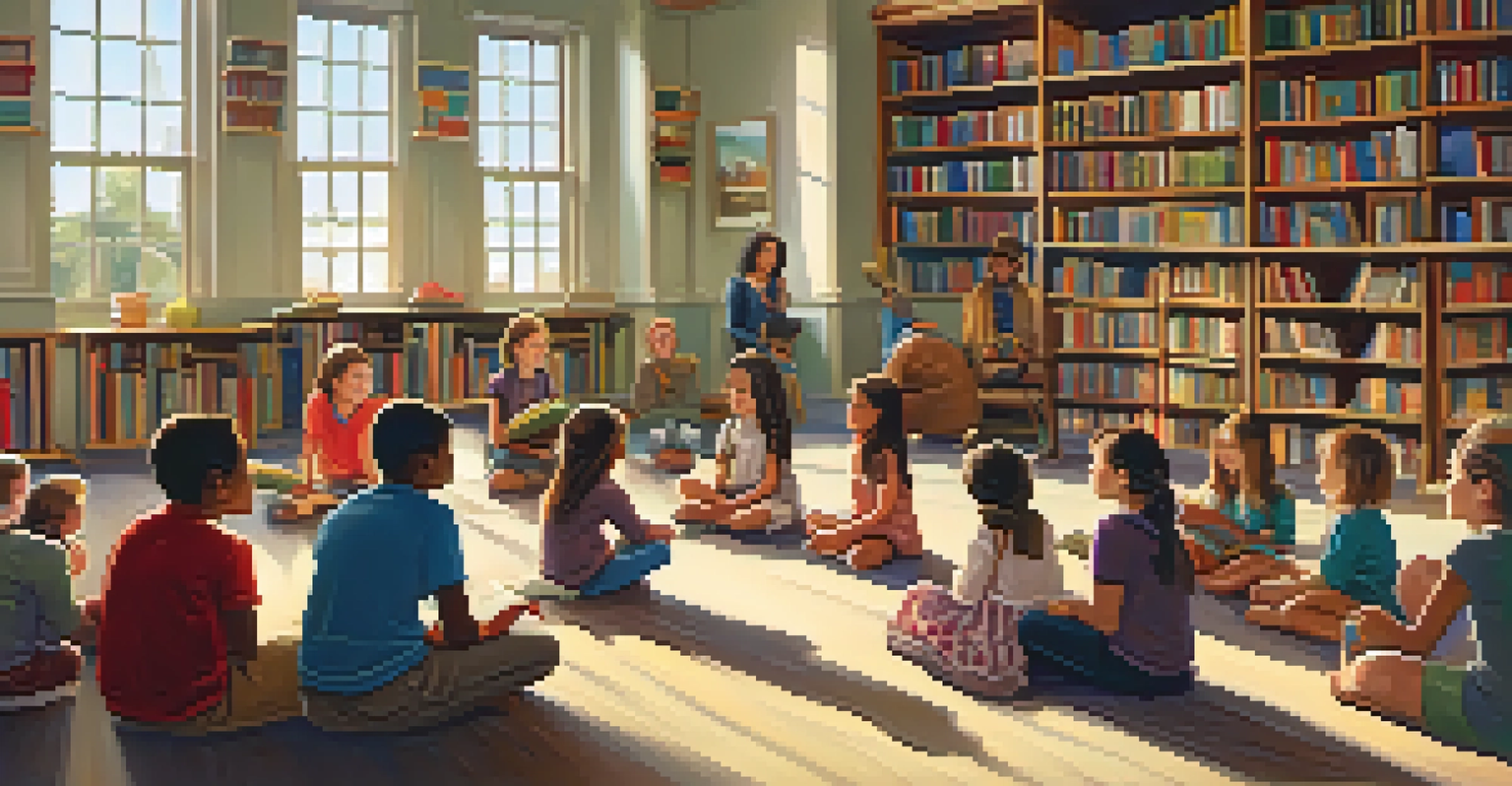The Role of Storytelling in North Carolina's Cultural History

The Historical Roots of Storytelling in North Carolina
Storytelling in North Carolina has deep historical roots, dating back to Indigenous tribes who shared oral traditions. These stories served not only as entertainment but also as vital lessons about life, culture, and the environment. Over time, as settlers arrived, their own stories began to intertwine with those of the Native communities, creating a rich tapestry of narratives.
Storytelling is the most powerful way to put ideas into the world today.
As the state evolved, storytelling became a means of preserving history and heritage. Local legends and folklore emerged, reflecting the unique experiences of different communities. For instance, tales of the Lost Colony and the famous Brown Mountain Lights continue to spark curiosity and intrigue among residents and visitors alike.
This blend of Indigenous and settler narratives laid the groundwork for a vibrant storytelling culture, which continues to thrive today. Through festivals, gatherings, and educational programs, North Carolinians keep their storytelling traditions alive, ensuring that these historical threads remain woven into the fabric of modern life.
Storytelling as a Tool for Community Building
In North Carolina, storytelling acts as a powerful tool for community building, fostering connections among individuals. By sharing personal narratives, people can relate to one another's experiences, cultivating empathy and understanding. This communal aspect of storytelling helps to strengthen social bonds and create a sense of belonging.

Local storytelling events, such as the North Carolina Storytelling Festival, provide platforms for both seasoned narrators and newcomers to share their tales. These gatherings not only entertain but also encourage dialogue and exchange of ideas, enhancing community engagement. Such events become a melting pot of diverse stories, reflecting the state's multifaceted identity.
Storytelling's Rich Historical Roots
North Carolina's storytelling traditions are deeply rooted in the oral histories of Indigenous tribes and settlers, preserving cultural heritage.
Moreover, storytelling can be a catalyst for social change, as it often highlights issues faced by specific communities. By voicing their struggles and triumphs, storytellers can inspire action and raise awareness, ultimately leading to greater solidarity and support among residents.
The Influence of Folklore and Myths
Folklore and myths play a significant role in shaping North Carolina's cultural narrative. These stories, often passed down through generations, encapsulate the values, beliefs, and fears of the people. From tales of haunted places to legendary figures like the Boojum, folklore adds a mystical dimension to the state's identity.
The stories we tell ourselves shape our identities and our futures.
The unique landscape of North Carolina, with its mountains, forests, and coastlines, provides a rich backdrop for these tales. They often incorporate elements of nature, creating a deep connection between the land and its stories. This relationship between geography and storytelling not only enriches the narratives but also fosters a sense of pride and stewardship for the environment.
Additionally, folklore serves as a means of preserving cultural heritage in a rapidly changing world. By keeping these stories alive, North Carolinians honor their ancestors and maintain a link to their roots, ensuring that future generations appreciate the rich tapestry of their history.
Storytelling in Music and Literature
North Carolina's storytelling tradition extends into the realms of music and literature, where narratives take on new forms. The state's rich musical heritage, including bluegrass and folk, often tells stories of love, loss, and everyday life. These songs serve as both entertainment and a way to convey cultural values and historical experiences.
Similarly, writers from North Carolina, such as Thomas Wolfe and Zora Neale Hurston, have used storytelling to explore complex themes and human experiences. Their works often reflect the struggles and triumphs of their communities, providing insight into the lives of North Carolinians. This literary tradition continues to inspire new generations of writers and storytellers.
Community Building Through Stories
Storytelling fosters connections among individuals, enhancing empathy and understanding within North Carolina communities.
By blending storytelling with music and literature, the state creates a dynamic cultural landscape that resonates with both locals and visitors. These artistic expressions not only entertain but also serve as a means of preserving history and fostering a deeper understanding of the human experience.
The Role of Storytelling in Education
Storytelling plays a crucial role in education throughout North Carolina, enriching the learning experience for students of all ages. Educators often incorporate storytelling techniques into their lessons, making complex topics more relatable and engaging. This approach helps to capture students' imaginations and foster a love for learning.
In addition to traditional classroom settings, storytelling is also utilized in community programs and libraries. Workshops and storytelling circles provide opportunities for children and adults alike to practice their narrative skills, enhancing their confidence and creativity. This communal learning environment reinforces the importance of sharing stories as a way of connecting with others.
Moreover, storytelling in education can help preserve local history and culture. By encouraging students to explore their own narratives and those of their communities, they gain a deeper appreciation for their heritage. This connection to the past not only enriches their education but also strengthens their identity as North Carolinians.
Modern Storytelling Platforms and Technologies
In today's digital age, storytelling has found new platforms and technologies that expand its reach and impact. Social media, podcasts, and online video platforms have become popular venues for sharing stories, allowing individuals to connect with wider audiences. North Carolinians are utilizing these tools to tell their stories, showcasing the state's diverse culture and history.
For instance, platforms like YouTube and Instagram have given rise to a new generation of storytellers who share their experiences through vlogs and visual narratives. This evolution has made storytelling more accessible, enabling people from all walks of life to share their unique perspectives and connect with others across the globe.
Modern Challenges and Future Prospects
Despite facing challenges from digital entertainment and globalization, North Carolina's storytelling tradition continues to thrive through innovation and inclusivity.
Despite the shift to digital platforms, the core essence of storytelling remains unchanged—sharing human experiences. The blend of traditional storytelling elements with modern technology creates exciting opportunities for innovation, ensuring that North Carolina's rich cultural history continues to thrive in new and engaging ways.
Challenges Facing Storytelling Traditions
While storytelling remains a vibrant aspect of North Carolina's culture, it faces certain challenges in the modern era. Rapid technological advancements and changing social dynamics can sometimes overshadow traditional storytelling practices. As people become more engrossed in digital entertainment, there is a risk of losing the communal aspect of storytelling that has been central to North Carolina's heritage.
Additionally, the globalization of culture can lead to a dilution of local narratives. As diverse cultures intertwine, unique regional stories may struggle to find their place in a broader context. This highlights the importance of actively preserving and promoting local storytelling traditions to ensure they remain relevant and valued.

Despite these challenges, many North Carolinians are committed to keeping their storytelling traditions alive. Through workshops, festivals, and community initiatives, they continue to celebrate and share their narratives, fostering a renewed appreciation for the art of storytelling in today's world.
The Future of Storytelling in North Carolina
The future of storytelling in North Carolina looks promising, as new generations embrace the art form in innovative ways. With the rise of digital platforms, young storytellers are finding fresh avenues to share their narratives, ensuring that the state's rich cultural history is not only preserved but also evolved. This blend of tradition and innovation creates exciting possibilities for storytelling.
Moreover, as communities continue to prioritize inclusivity and representation, diverse voices are emerging within the storytelling landscape. This shift enriches the narratives being shared, providing a broader perspective on the experiences of North Carolinians. By amplifying these voices, storytelling becomes a powerful tool for fostering understanding and unity.
As we look ahead, it is clear that storytelling will remain a vital part of North Carolina's cultural identity. By nurturing both traditional practices and contemporary expressions, the state will continue to celebrate its unique heritage while inspiring future generations to share their own stories.